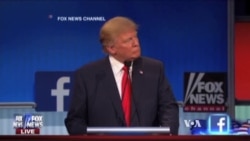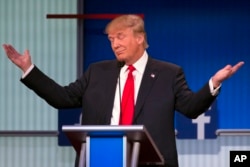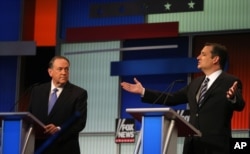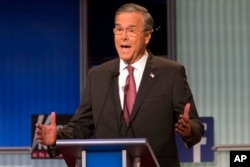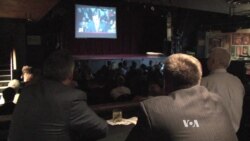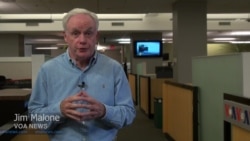The top 10 Republican U.S. presidential candidates officially launched the 2016 campaign season with their first debate in Cleveland, Ohio. And despite the hype and the buildup, in many ways the debate rose to expectations.
Billionaire Donald Trump gave notice he is not going to collapse anytime soon and that he will eagerly respond to attacks.
But Trump may have sparked doubts among some Republicans about his commitment to the party.
He was the only candidate on stage who refused to commit to supporting the eventual Republican nominee, nor would he rule out a possible third-party bid for president.
“I will not make the pledge at this time,” Trump said, when pressed by one of the moderators.
That brought a sharp response from Kentucky Senator Rand Paul: “He’s already hedging his bets because he’s used to buying politicians.”
Paul was one of the few to go on the offensive against Trump in the two-hour debate.
Women, immigration
Trump was also aggressive in fending off criticisms of past comments offensive to women.
He told moderator Megyn Kelly of the Fox News Channel that he has been challenged by so many people that “I don’t frankly have time for political correctness. This country is in big trouble.”
But some of the voter focus groups questioned on the Fox News Channel after the debate had some negative reactions to Trump’s tone and what they saw as evasiveness on some issues.
Trump defended his previous controversial comments about illegal immigrants from Mexico, some of whom he described as “criminals” and “rapists.”
“If it weren’t for me, you wouldn’t be talking about illegal immigration," he quipped.
Trump also noted former Florida Governor Jeb Bush had objected to his “tone” when he talked about immigration.
Bush responded that he found Trump’s language “divisive” and he stood by his view that immigrants trying to come to the U.S. do so out of “an act of love.”
Senators Marco Rubio of Florida and Ted Cruz of Texas also urged better control of the U.S. borders as part of the immigration discussion.
Iran nuclear deal
Several of the contenders strongly criticized the Obama administration over the nuclear deal with Iran and its efforts to counter the Islamic State. Cruz said the U.S. would not be victorious until there is a president willing to “utter the words radical Islamic terrorists.”
On the Iran deal, Wisconsin Governor Scott Walker said he would “terminate the deal on day one” in office. Former Arkansas Governor Mike Huckabee said President Obama’s approach on the deal seemed to be “trust but vilify.” The day before the debate, Mr. Obama made an impassioned defense of the deal in a speech in Washington.
Terrorism, privacy
In one of the feistier exchanges of the night, Rand Paul and New Jersey Governor Chris Christie had a spirited back-and-forth over how to balance defending the country from terrorist attack with protecting the Bill of Rights.
"I want to collect more records from terrorists and less from regular Americans," said Paul, who is an outspoken critic of the NSA's bulk collection of American telephone records.
Governor Christie shot back, calling Paul's answer "completely ridiculous."
"You know senator, when you’re sitting in a sub-committee just blowing hot air about this, you can say things like that. When you’re responsible for protecting the lives of the American people, then what you need to do is to make sure that you use the system the way it’s supposed to work," Christie said.
The exchange was reflective of a widening gap within the Republican Party between those who favor more hawkish national security policies and those who prefer a more libertarian approach.
One thing is certain; the Iran deal and the fight against the Islamic State will remain as key issues in the presidential campaign for the foreseeable future.
Bush: I'm proud of my brother
Former Florida Governor Jeb Bush, widely seen as a frontrunner and a favorite of establishment Republicans, acknowledged he must be able to differentiate himself from his brother, former President George W. Bush, and his father, ex-President George H.W. Bush.
"I'm going to have to earn this," Bush acknowledged. "Maybe the bar is even higher for me. That's fine. I've got a record in Florida. I'm proud of my dad, and I'm proud of my brother."
Highlighting one policy difference with his brother, Bush acknowledged the 2003 U.S. invasion of Iraq "was a mistake," even while blaming President Barack Obama for the subsequent rise of the Islamic State, or ISIS.
"Barack Obama became president and he abandoned Iraq," Bush said. "And when he left, ISIS was created by the void that we left, and that void now exists as a caliphate the size of Indiana."
First major test
The Cleveland debate was the first major test for the Republican contenders.
But at least eight more debates are scheduled and there will be plenty of opportunity for voters to take their measure of the candidates as they appear on stage.
“Thinking on their feet is going to be an interesting moment because right now they are all pretty much still mouthing talking points and staying within their individual campaign bubbles,” said Republican analyst Scot Faulkner.
WATCH: Related video report from Kane Farabaugh
Other contenders
Prior to the main debate event, the seven other Republican contenders who did not make the cut took to the stage in Cleveland for what some called the “Happy Hour” debate, or the “undercard.”
There were no major fireworks in the earlier debate but there were some slashing attacks on President Obama’s leadership and on Democratic frontrunner Hillary Clinton.
South Carolina Senator Lindsey Graham said Clinton would “represent the third term of a failed presidency.”
Former Hewlett-Packard CEO Carly Fiorina also went after Clinton, asserting that she lied about the Benghazi terrorist attacks in 201,2 when she was secretary of State, and about the email controversy involving her use of a private email server while at the State Department.
Fiorina, former Texas Governor Rick Perry and Louisiana Governor Bobby Jindal all had strong moments in the earlier debate.
That round also featured former Virginia Governor Jim Gilmore, former New York Governor George Pataki and former Pennsylvania Senator Rick Santorum, who finished second to Mitt Romney in the 2012 race for the Republican nomination.
Democratic Party officials, meanwhile, have announced their debate schedule. Six debates are planned, with the first on October 13 in Nevada. At least one of Hillary Clinton’s challengers, former Maryland Governor Martin O’Malley, said he would like more.
“In an ideal world, we’d have more debates before the Iowa caucus,” which will take place in February.
William Gallo contributed to this report.
WATCH: Political correspondent Jim Malone discusses the debate




